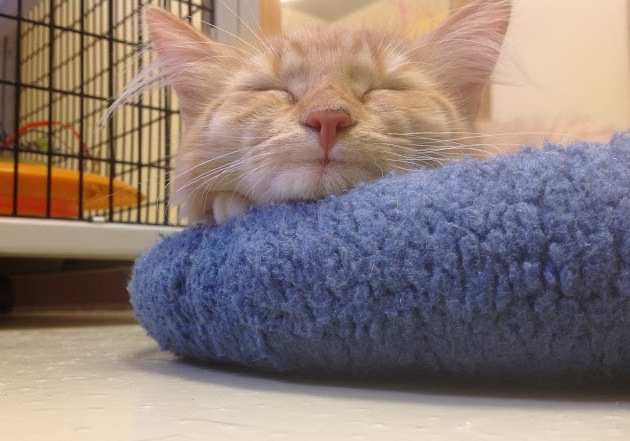St. Paul’s shelter animals will be given a second chance beginning in 2015, thanks to an ordinance unanimously approved by the city council this November.
The ordinance, championed by the city’s Animal Control Supervisor Molly Lunaris, will change the city’s current euthanasia policy, as well as require shelters to show their live release rates – the number of animals that leave a shelter alive.
Currently, St. Paul animal shelters must keep healthy animals for a five-day-long waiting period before euthanizing them. The new ordinance will require shelters to only euthanize healthy animals they do not have the resources to care for. Lunaris said the new policy will give animals a greater chance of being placed in homes.

“Basically we’re looking at euthanizing animals only when we don’t have the resources to take care of them rather than euthanizing them because an imaginary clock expired,” Lunaris said. “That means that animals could be held here for longer periods of time while we’re looking for homes, and it gives them a better chance to find a new placement.”
Senior Tyler Rivard said he supports the ordinance.
“For a lot of animals, it would take more than five days to find a home, so I think it’s a pretty good idea,” Rivard said. “I don’t think we should just necessarily go around euthanizing after five days.”
Lunaris said many people see animal shelters as places where animals are automatically put down, and she wanted to change that perception.
“What I find is that when you interact with the public, whether it’s with a stray animal or an animal that sadly they’re no longer able to care for, one of the things we always hear from them is ‘please don’t kill it,’” Lunaris said. “The reason I championed it is it makes me really sad that the public thinks that we’re all about killing, because that’s not what animal sheltering is.”
Jocelyn LaBerge, a member of the board of directors of Feline Rescue Inc., a St. Paul no-kill animal shelter, said the ordinance is a positive step.
“I think it’s a great idea,” LaBerge said. “I’m seeing more and more increased working with the local animal controls with the local shelters. It’s a trend we’ve seen over the last few years that they’re more likely to want to work directly with the shelters when they’re full, and that’s a wonderful, wonderful trend.”
To create the ordinance, Lunaris and St. Paul Animal Control, the city council and representatives from the city’s animal shelters worked together to rewrite model legislation put out by a national no-kill movement.
Some animal welfare groups, including People for the Ethical Treatment of Animals have criticized the new ordinance. PETA has said ordinances like the one in St. Paul will lead to overcrowded shelters and expose animals to diseased and aggressive cage-mates. However, Lunaris said she doesn’t think this will be a problem in St. Paul.
“PETA has not even reviewed the St. Paul language. Their criticism was based on the national model language, and one of the things in that model language that it did require shelters to do was to fill up all cages and perhaps even house animals together,” Lunaris said. “We did remove that language from the St. Paul ordinance because that was not a practical thing for us to do at this level.”
Faith Pawl, a St. Thomas ethics professor, said ordinances like the one in St. Paul pit two camps of animal welfare activists against each other.
“There are two ways to compare it,” Pawl said. “The let’s-not-euthanize-animals camp is saying … (animals) have some sort of right to life, and we shouldn’t deprive them of that right. Whereas the PETA camp is more concerned with animal suffering. It’s not that animals have a right to life, it’s that we should minimize suffering.”
Pawl said the group is concerned with animal suffering rather than their right to life focus on the good of animals is a group instead of the rights of each individual animal. According to Pawl, public opinion may have played a role in the passing of the ordinance.
“I think people in general are opposed to euthanasia,” Pawl said. “We all just sort of intuitively think that that’s what would be best without maybe thinking through the implications or just how hard it is to do that in a way that animals still have a quality of life.”
Freshman Jenna Zimmerman said she hopes fewer animals are euthanized.
“I love animals, so I feel like every animal should get a home and they shouldn’t (euthanize animals),” Zimmerman said. “More animals will get more homes, and I feel like a pet is good for any family.”
Grace Pastoor can be reached at past6138@stthomas.edu.




I can’t tell if that cat is my new best friend or if it’s my new best friend. Hint: it’s my new best friend.